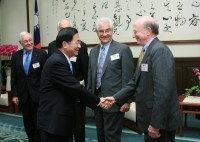President Chen Shui-bian Meets Visiting Delegation of Members of the National Committee on American Foreign Policy

President Chen Shui-bian on May 23 met a delegation of members of the National Committee on American Foreign Policy. He expressed his warm welcome and gratitude to the visitors on behalf of the government and people of the ROC (Taiwan). He also took advantage of the opportunity to exchange opinions with the visitors on Taiwan-US ties, cross-strait relations and public referendums.
President Chen said that in his inauguration address in 2000, he specially made his so-called "Four No's Plus One" pledge, which would remain intact as long as China did not intend to use military force against Taiwan. He said that this pledge remains in effect to this day. The president said that his pledge is in part responsible for the peace, security and stability in the Taiwan Strait that is enjoyed today.
In response to moves by China to destroy and change the status quo in the Taiwan Strait, the president said that Taiwan is a sovereign nation and is not under the jurisdiction of the People's Republic of China. He said that China has repeatedly sought to belittle, marginalize and localize Taiwan, even aiming to reduce state power of Taiwan. The president said these actions indicate that China is gradually damaging the status quo and changing the situation. China is also employing military threats, is making efforts to isolate Taiwan on the diplomatic front and is moving to squeeze its economy, all of which constitute measures seeking to change the status quo in the Taiwan Strait, he said. For instance, the president said, Taiwan's efforts to become a member of the World Health Organization have been blocked.
The president also discussed the issue of referendums on Taiwan, a topic of concern to the visitors. President Chen said that presently two petitions are presently being circulated throughout Taiwan to gain the signatures needed to hold a national referendum. One of the petitions addresses ill-gotten assets by political parties and the other is to call for support for Taiwan to enter the United Nations under the name "Taiwan." Referendums regarding constitutional amendments or the creation of a new constitution are handled according to procedures stipulated in the constitution. Presently, these rules require that such initiatives must be passed by at least three-fourths of the members of the Parliament. After draft proposals are put forward, a public referendum is held. At least 50% of the public must vote in favor of the amendments for the new constitution to take effect. President Chen said that the thresholds stipulated in the constitution are quite high. Therefore, a high level of consensus among ruling and opposition party lawmakers is required. Presently, there is no constitutional reform bill or version that could pass the three-quarters level required by the constitution. As a result, at present it is impossible that a referendum on the constitution would be held. The president said that there is no contradiction in his "Four No's" pledge and Taiwan's move to apply for entry into the UN under the name "Taiwan." He said that the spirit of the application is no different than Taiwan joining the World Trade Organization under the name "Separate Customs Territory of Taiwan, Penghu, Kinmen and Matsu" or Taiwan's participation in the Olympic Games under the name "Chinese Taipei."
President Chen stressed that the most important thing for Taiwan now is for everyone to be united and for the nation's people to forge a common awareness. He said the 23 million people of Taiwan will certainly maintain their Taiwan consciousness and that Taiwan will not be a vassal to China. As a result, he said the government is employing a variety of means to build this awareness and is urging the international community to listen to the voices of Taiwan's 23 million people.